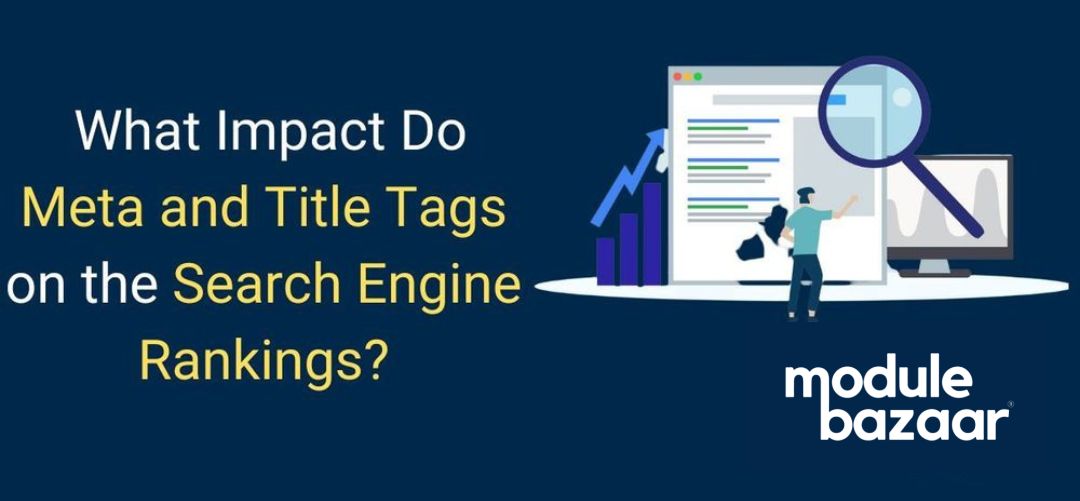Share the post "What Impact do Meta and Title Tags Have on the Search Engine Rankings?"
You must have come across meta and title tags when optimizing your website for the search engine. These two are the vital components of on-page SEO. But, the question is, how important are these tags for your website ranking? Do they affect your search engine ranking? How can you add meta and title tags to your content for better SERP ranking?
What are Meta Tags and Title Tags?
Meta tags appear in the source code of your web page and are known to give people insights into the type of content your page has. Note that these tags are not visible to the users but are included in the source code in order to help search engines identify the type of content you are publishing and rank your website based on the relevancy of your post to your niche. Meta tags are found in the HTML header.
There are four types of meta tags, although not every tag is important to Google. Some, however, play a key role in your website ranking. It includes:
- Meta Description: A few lines about your post, giving your readers a quick insight into the type of content and what you are posting about.
- Meta Robots: It works as an indicator that informs search engine bots about what they should do with your web page.
- Meta Keywords Attribute: A list of keywords that are important for the pages
- Title Tag: Search engine crawlers consider the title tag the page’s title. It appears on top of your browser.
Of all these, title tags are the most important and the only tags that are visible to users. They affect your search engine ranking. The title tag doesn’t necessarily have to be the title of your post. However, it is perceived as the title by Google. Sometimes, the title is too long to be displayed on the search results. You can use a title tag, a shorter version of the title consisting of the essential keywords that brief people about what your content is about.
So, how exactly do these tags affect your SERP ranking?
Read Also:- 7 Ways to Maintain Your SEO Ranking
Helps in Website Indexing
You want your post to appear on the search results page when a user types a query relevant to your niche. Your meta tags help you achieve that. Meta tags are used for simplifying website indexing. Websites with metadata relevant to the user queries have a very good chance of ranking higher on the search results page than those without meta and title tags. So, a good reason you need to use meta and title tags in your on-page SEO strategy is to improve website indexing.
Rank Your Keywords Higher in the Search Results Page
The ultimate goal of a website owner is to rank their pages higher on the search results. You don’t just want Google bots to index your website, but rank it on the first page of the search results so that your target audience can find it easily. One of the important elements of meta tags is the meta description. It is a brief description that tells users about your content. Although it doesn’t directly affect your website ranking, meta description significantly impacts your click-through rate. Adding keywords to the tags increases your chances of ranking higher in the search engine.
Better User Experience
Meta tags are important not only because they help you in improving your website ranking, but these tags can organize information on your page in order so that your viewers can understand what the page is about just by looking at the meta tags. It also makes your content readable, thus increasing the time an average user spends on your website.
Importance of Title Tags
As mentioned above, title tags are the only important element of the meta tags. These are visible to your audience, meaning they will affect your website ranking significantly. Most people decide if they should visit a website after checking the title tags. If the title looks enticing, they click on the URL to read further. The same goes for search engine crawlers. They check your title tags to determine how relevant your content is to your niche. Here are some tips for writing an effective title tag:
- Keep the number of characters below 60
- Add words that tell users what they will learn from your post, such as “Guide,” “How to,” “tips and tricks,” etc.
- Add your keywords
- Make it clear, crisp, and readable
- Do not overstuff keywords
- The title should be 100% unique and relevant to your post or web page.
These are the reasons why meta and title tags are important for your SERP ranking. Optimize your website for search engine rankings using the right title and meta tags. Boost your search engine ranking following the above tips. Hope it helps!


